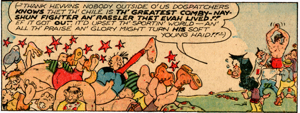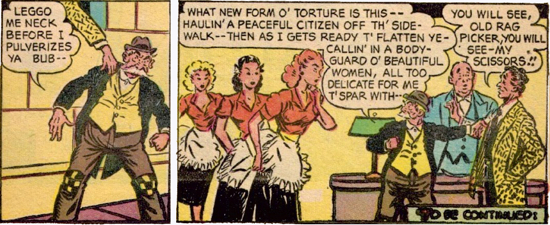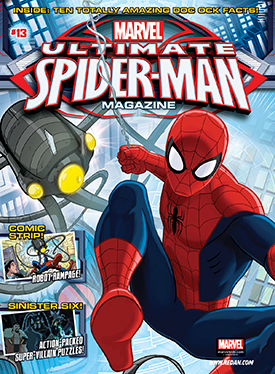Mike Gold: How To Read American English Comics
When I stop to think about it – and, obviously, I just did – it’s a miracle I’ve learned how to write and speak American English… at least to the extent that I have.
 Like a great many comic book fans, I was a precocious reader. This was long before The Simpsons’ Comic Book Guy was revealed to be in Mensa – an organization that could double as ground zero for Geek Culture. I learned how to read because my sister is almost seven years older than me and she got stuck with the chore of babysitting. Marcia would read me her comic books and I quickly discovered the comics page in the old (and deeply missed) Chicago Daily News. Between the newspaper and my sister’s comic books, I became an incessant reader.
Like a great many comic book fans, I was a precocious reader. This was long before The Simpsons’ Comic Book Guy was revealed to be in Mensa – an organization that could double as ground zero for Geek Culture. I learned how to read because my sister is almost seven years older than me and she got stuck with the chore of babysitting. Marcia would read me her comic books and I quickly discovered the comics page in the old (and deeply missed) Chicago Daily News. Between the newspaper and my sister’s comic books, I became an incessant reader.
The problem was, that newspaper carried such brilliant strips as Pogo, Li’l Abner, and Abbie an’ Slats. Many of the characters in those strips didn’t speak American English or British English or any other recognizable form of our mother tongue. Pogo and Albert and friends spoke Okefenokee Swamp English, a dialect so thick it would baffle Tennessee Williams. Abner, Daisy Mae, “Bathless” Groggins, and Slats Scrapple spoke a particularly cloistered version of hillbilly. Both Li’l Abner and Abbie an’ Slats were created and written by Al Capp, although Capp gave the A&S writing chores over to his brother Eliot Chaplin after World War II.
 As you can see from the art scattered around these words, they simply did not have United Nations translators for these features.
As you can see from the art scattered around these words, they simply did not have United Nations translators for these features.
The Daily News carried other strips, of course, but those three were among the truly brilliant. I also enjoyed Louie – a pantomime strip that, by definition, was bereft of dialogue.
I suspect my love of Golden Books was the counter-influence that put me on the straight-and-narrow. I graduated to biographies, which I love, and then to science-fiction and heroic fantasy and history. All of this happened because my sister read me her copies of Superman, Katy Keene and Mutt and Jeff.
So it is no surprise that I am a huge supporter of early reading programs. I’ve done a great deal of youth social service work in my life, and I’ve taken every opportunity to help such programs as Head Start, Reading is Fundamental, and Literacy Volunteers.
I remember when, back before Coggia’s Comet was discovered, the legendary Maggie Thompson wrote about how she and her husband Don used comic books as reading tools in raising their family. Damn, that worked out fine. It was difficult for me to convince some that comics would be useful in this endeavor back in my earliest days, but with great movie box office comes great acceptance. Drop a copy of Ultimate Spider-Man Magazine or Scooby-Doo Magazine in a kid’s lap and help the child read it. Discuss the stories afterwards. Watch their sense of wonder grow right before your very eyes.
Not only will you be forging the next generation of readers, but you will be keeping the sundry literary markets alive. That includes comic books, which easily could be replaced by superhero movies and television if we don’t get circulations boosted up.
This, in turn, will inspire the next generation of comics creators. It will be wonderful to see where the post-Millennials can take us.













